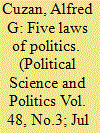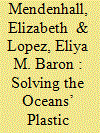| Srl | Item |
| 1 |
ID:
140222


|
|
|
|
|
| Summary/Abstract |
Drawing on more than 500 elections from around the world, this article presents five empirical laws of politics. Four of these laws span democracies and dictatorships, and one sets a boundary between the two. In both regimes the governing party or coalition represents a minority of the electorate. In democracies this minority usually represents a plurality that amounts to about one third of the electorate. Judging by the outcome of the first free elections in regimes undergoing a transition, there is reason to believe that in dictatorships the minority is much smaller. Even as they have an advantage over the opposition, the incumbents experience an erosion of support over time. In democracies this leads to alternation in office, which in turn ensures that across many elections about two-thirds of the electorate gets to see its favorite party or coalition in government from time to time. In dictatorships, during long periods in office, support for the ruling party shrinks to insignificance. Also in democracies, it is rare for incumbents to receive more than 60 percent of the vote, and it never happens twice within the same spell in government. This appears to be a reliable indicator that differentiates all democracies from most dictatorships. The conclusion is inescapable—the dictatorial “passion for unanimity” and illusion of “organic unity” notwithstanding, the state is a plurality. The will of the electorate emerges as a result of competition among political parties.
|
|
|
|
|
|
|
|
|
|
|
|
|
|
|
|
| 2 |
ID:
169831


|
|
|
|
|
| Summary/Abstract |
“The best set of solutions is likely to span the scale from individual to international action, and to address different points along the chain of production, consumption, and disposal.”
|
|
|
|
|
|
|
|
|
|
|
|
|
|
|
|
| 3 |
ID:
097238


|
|
|